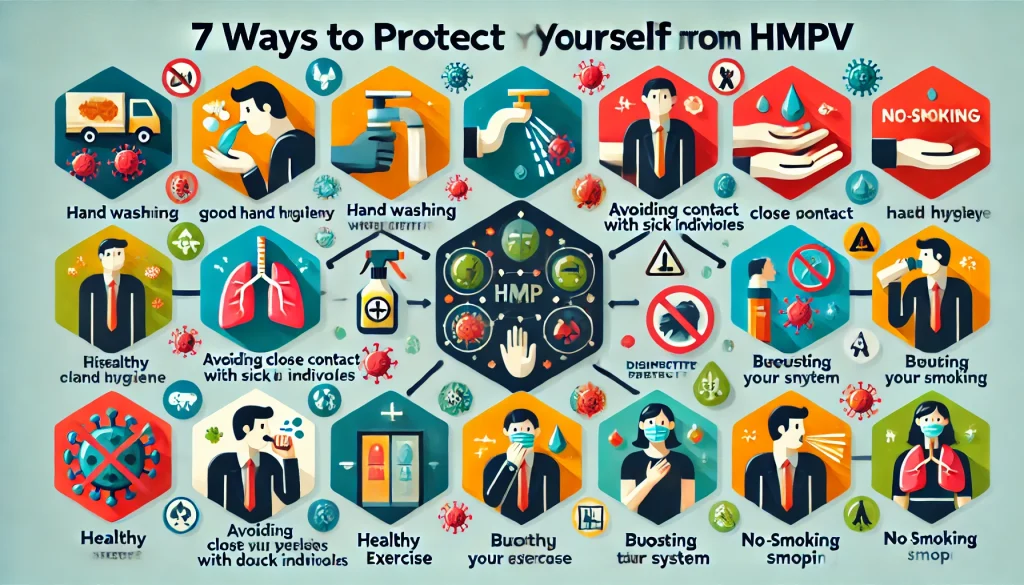
Human metapneumovirus (HMPV) is a respiratory virus that can cause symptoms ranging from mild cold-like discomfort to severe respiratory distress, particularly in young children, the elderly, and immunocompromised individuals. Fortunately, with a few proactive steps, you can significantly reduce your risk of infection.
This guide will walk you through simple, practical ways to protect yourself and your loved ones from HMPV, with clear, actionable advice that’s easy to follow.
What Is Human Metapneumovirus (HMPV)?
HMPV is a contagious virus that primarily affects the respiratory tract. Similar to the flu or common cold, it spreads through respiratory droplets when an infected person coughs or sneezes. While it can be mild, it sometimes leads to complications such as pneumonia or bronchitis, especially in vulnerable populations.
Symptoms often include:
- Cough
- Fever
- Nasal congestion
- Difficulty breathing
Understanding the virus is the first step in staying safe.
How Does HMPV Spread?
HMPV spreads through:
- Close Contact: Being within 6 feet of an infected person.
- Touching Contaminated Surfaces: The virus can survive on surfaces for hours.
- Inhaling Droplets: Coughing or sneezing releases viral particles into the air.
Being aware of these transmission methods is key to prevention.
Simple Steps to Avoid Human Metapneumovirus HMPV Virus
1. Wash Your Hands Frequently
Regular handwashing with soap and water for at least 20 seconds is one of the most effective ways to stop the spread of HMPV.
- Wash your hands after coughing, sneezing, or touching public surfaces.
- Use hand sanitizer with at least 60% alcohol when soap isn’t available.
2. Avoid Touching Your Face
Viruses enter the body through mucous membranes in the eyes, nose, and mouth. Avoid touching your face, especially with unwashed hands.
3. Practice Respiratory Hygiene
Cough or sneeze into your elbow or a tissue, and dispose of used tissues immediately. This prevents droplets from spreading to others.
4. Disinfect Commonly Touched Surfaces
Regularly clean surfaces like:
- Doorknobs
- Light switches
- Cell phones
- Remote controls
Use disinfectant wipes or sprays that are proven to kill viruses.
5. Strengthen Your Immune System
A robust immune system helps fight off infections, including HMPV. Boost your immunity by:
- Eating a balanced diet rich in fruits, vegetables, and lean proteins.
- Staying hydrated.
- Getting regular exercise.
- Prioritizing sleep.
6. Stay Home When Sick
If you or a family member are feeling unwell, stay home to avoid spreading the virus to others. Rest and recovery are also essential for your health.
7. Keep Your Distance During Outbreaks
Avoid crowded places during peak flu or virus seasons. Maintaining physical distance reduces your risk of exposure.
Who Is at Risk for Severe HMPV?
Certain groups are more vulnerable to severe illness from HMPV, including:
- Infants and young children
- Adults over 65
- People with weakened immune systems
- Individuals with chronic respiratory or heart conditions
If you or someone in these categories shows symptoms, seek medical advice promptly.
What to Do if You Think You Have HMPV
If you suspect you’ve contracted HMPV, follow these steps:
- Rest and hydrate.
- Use over-the-counter medications for symptom relief.
- Monitor your symptoms, especially difficulty breathing or high fever.
- Contact a healthcare provider if symptoms worsen.
Early intervention can prevent complications.
Can You Prevent HMPV Entirely?
While it’s impossible to eliminate the risk of catching any virus entirely, practicing good hygiene, maintaining a healthy lifestyle, and being mindful of exposure significantly reduce your chances. Prevention is about consistency.
FAQs
How long does HMPV last?
Symptoms usually last 7–10 days but can be longer in severe cases.
Can HMPV cause long-term complications?
In most cases, no. However, in vulnerable individuals, it can lead to severe conditions like pneumonia.
Is there a vaccine for HMPV?
Currently, no vaccine exists for HMPV. Preventative measures are the best defense.
Are children more likely to get HMPV?
Yes, children, especially those under 5, are at higher risk of infection.
Can I get HMPV more than once?
Yes, like the common cold, you can get reinfected with HMPV, though subsequent infections are often milder.
How can I tell the difference between HMPV and the flu?
While symptoms overlap, flu often includes body aches and chills. A healthcare provider can help diagnose the condition accurately.
Conclusion
Protecting yourself and your loved ones from human metapneumovirus starts with simple, everyday actions. By staying informed, practicing good hygiene, and boosting your immune system, you can significantly reduce your risk of infection. Together, these measures create a powerful defense against HMPV and other respiratory viruses.
Stay safe and proactive—your health is worth the effort!